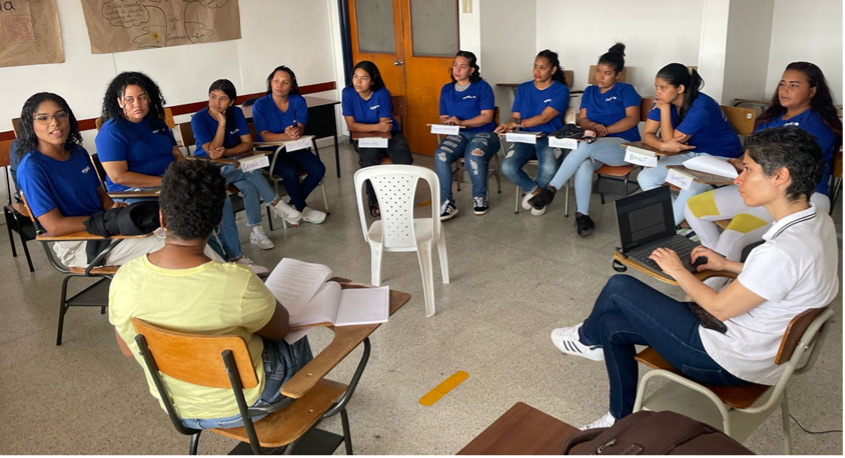Blog
-

-
Country Representative, IFC Colombia
-

-
Operations Officer, IFC Sustainable Infrastructure Advisory
Jun 27, 2025

Photo Credit: Compromiso Valle. In Colombia, women spend an average of 34 hours a week in unpaid care work, compared to 12 hours for men (ECLAC, based on DANE 2021).
Imagine having to choose between caring for your children and a living wage. That’s the reality for many women, especially low-income women. The lack of affordable and quality childcare forces them to choose between getting a job to cover their family expenses or not taking paid work so they can care for their families.
In Colombia, for instance, women spend nearly eight hours a day on unpaid care work, on average—essentially a full-time job. Meanwhile, at about three hours a day, men devote considerably less time to unpaid care work. This is a likely reason that in Cali, where the poor represent nearly a quarter of the population, only five in ten women hold a job —they simply cannot afford to pay someone else to handle their full-time care duties.
The Economic Commission for Latin America and the Caribbean estimates that reducing gaps in access and opportunity for women in Colombia could increase the nation’s GDP by up to 4 percent—signaling an urgent call to action for solutions that drive inclusive development, if the country is to advance its economic growth goals. ProPacífico, a key player in the city of Cali and the Valle del Cauca region has responded to this call, with its Compromiso Valle program, which trains young women and men and connects them with employment opportunities in the private sector.
But in implementing the program, the Compromiso Valle team detected a problem: young women participants had difficulty retaining the jobs they were hired for. Many cited issues associated with their duties at home, such as difficulty balancing work life with care work, the mental burden of these responsibilities, and the insufficient supply of childcare services.
The women were not alone in losing out due to lack of childcare. The businesses did too. This is not uncommon, with studies highlighting how company-supported childcare services can yield business benefits, such as lower absenteeism, lower staff turnover, increased diversity and productivity, and more workforce engagement.
Businesses Focus on Social Value, not on Business Case
To gain an in-depth understanding of the challenges related to care work and opportunities for businesses in Cali, IFC and ProPacífico conducted a study that explored the experiences of the women and companies involved with Compromiso Valle. The study found that while several companies supported childcare, they did so out of a social commitment, rather than out of an understanding of the business opportunity in addressing the issue.
Family-friendly measures implemented by the companies surveyed for the study included flexible working hours, telework, and rotating shifts. Companies also put in place parental leave policies and training, with 30 percent of surveyed firms offering supplemental leave days beyond those required by law.

Photo Credit: Amanda Diaz Ramirez. Focus group with women participants in Compromiso Valle.
The study determined that small and medium companies, which represent more than 20 percent of Valle del Cauca’s private sector, face the greatest challenges in implementing family-friendly measures. Childcare strategies and tools are often designed for large companies. This underscores the need to adapt current approaches and design innovative childcare services and policies tailored to the capacity and structure of smaller companies.
The study also sought to understand the perspective of the women who were placed in jobs through the program. They noted barriers due to childcare limitations, including insufficient supply, poor quality, and high cost. Some workers rely on family members to provide care, although this also creates a greater burden on other women, including minors. The limitations in the region’s care economy represent an even greater obstacle for migrant or internally displaced women, however, since they may be unable to rely on other family members for help.
“Women are always asked: who are they going to leave the children with? Who takes care of them? What if they get sick? So, having children is a barrier to being able to work,” said one of the interviewees.
Key Recommendations
The study offered several recommendations on ways to reduce women’s barriers to work.
Companies should put in place solutions tailored to the needs of employees, making use of data to guide decisions, monitor progress, and evaluate results. Other stakeholders have important roles to play as well. The public sector can explore synergies with the private sector to improve care services. The academia, along with industry associations and civil society organizations can advise companies, contribute to data collection and analysis, and promote the design of inclusive solutions.
According to Mariana Caicedo, executive deputy director of ProPacífico: “This project added value by providing concrete data and recommendations to deepen the conversation with the private sector in the region.”
Care work is essential to life. Providing solutions that enhance the care economy also represents an opportunity to strengthen companies with a more diverse and committed workforce, leading to better business results.
(With contributions from Daniel Molina.)
Click here for IFC’s Guide to Employer-Supported Child Care Services
Click here to learn about IFC’s toolkit “Engineering Inclusivity: Infrastructure for Everyone”
Haga clic aquí para leer el blog en español


